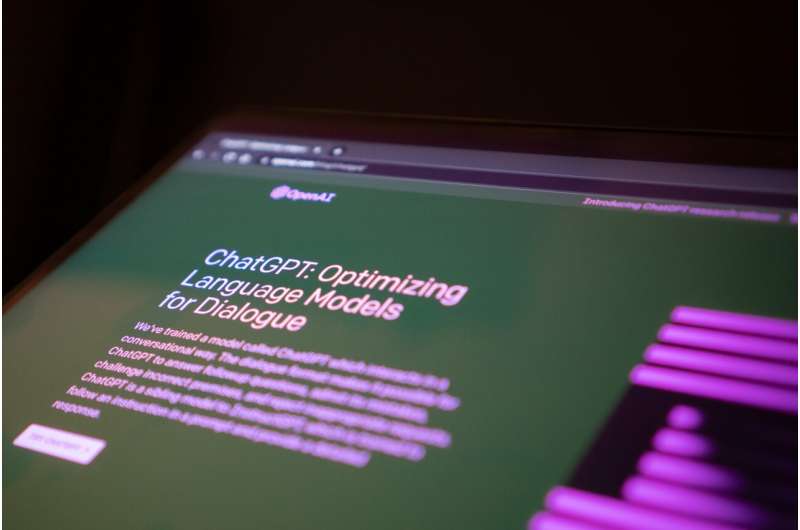This article has been reviewed according to Science X's editorial process and policies. Editors have highlighted the following attributes while ensuring the content's credibility:
fact-checked
reputable news agency
proofread
ChatGPT shows just how far Europe lags behind in tech

Europe is where ChatGPT gets regulated, not invented. That's something to regret. As unhinged as the initial results of the artificial-intelligence arms race may be, they're also another reminder of how far the European Union lags behind the US and China when it comes to tech.
How did the land that birthed Nokia Oyj and Ericsson AB become the land that tech forgot? Some blame the acronyms synonymous with Brussels red tape—GDPR, DMA, DSA—even though the Googles of this world look far more spooked by ChatGPT than any EU fine. Tech lobbyists are fuming at EU Commissioner Thierry Breton, who wants incoming AI rules toughened to rein in a new breed of chatbots.
But maybe Breton's old company, Atos SE, is a better example of the deeper malaise plaguing European tech. Aerospace champion Airbus SE has proposed an investment in Evidian, the big-data and cybersecurity unit that Atos plans to spin off this year. The potential deal has been presented as a boost to European tech "sovereignty" through growth in cloud and advanced computing.
One look at Atos's share price will reveal that the company is a symptom of, not a remedy for, Europe's tech decline. The company doubled revenue and employees in the 2010s through acquisitions, but was too slow to move to the cloud and away from older IT infrastructure. Meanwhile, the likes of Microsoft Corp. and Alphabet Inc.—the companies that are in a race to get chatbots with a personality into every home—splashed huge amounts of cash to grow their own cloud businesses and, together with Amazon.com Inc., control two-thirds of the global market.
The R&D gap between US and Europe looks relevant here. Alphabet and Microsoft were among the world's three biggest corporate spenders in research in 2021, at around $30 billion and $23 billion respectively, according to European Commission data. The only EU company in the top 10 was Volkswagen AG, which spent 15.6 billion euros ($16.6 billion). Airbus was far behind at 2.9 billion euros, as was Atos, at 57 million euros.
Policymakers might assume that all it takes to close the gap is to cobble together ever-bigger domestic or regional champions. But aspirations for a "European cloud" have accomplished little.
Former Atos executive Olivier Coste, in a new book about Europe's tech lag, sees the real issue as being more about the high cost of failure in the EU—in the form of corporate restructuring. Unlike in the US, laying off engineers costs several hundreds of thousands of euros per person, takes time to negotiate, and demotivates staff who stay on. That discourages risk-taking on tech projects with a high rate of failure, he reckons. It also explains why 20th Century-era industrial firms—better at incremental, not radical, innovation—outspend 21st-Century tech in the EU.
Coste's prescription is to reduce the cost of failure. He recommends a "flexicurity" approach, Denmark-style, to tech jobs. That would mean more flexibility to hire and fire, offset with the safety net of enough income to protect people who do lose their job. His is far from a consensus view; others suggest more disruptive innovation, like the US Defense Advanced Research Projects Agency, or Darpa. Another idea would be to pay European researchers better.
Obviously, Silicon Valley's recent spate of layoffs after pandemic overhiring doesn't look like something to emulate. But Atos is hardly in a solid place either. It has dragged its feet on restructuring and now needs 1.6 billion euros in extra funding through 2023. That number is basically equivalent to its current market capitalization, an embarrassment for a firm worth 13 billion euros in 2017. And it's not even clear that the Evidian spinoff is the best path forward given the growth outlook, according to Bloomberg Intelligence's Tamlin Bason.
It's not all doom and gloom. Recent moves like the European Investment Bank's 3.8 billion-euro venture-capital initiative could accelerate investment and innovation. But it's hard to shake a sense of deja vu as Europe defends its cyber-industrial complex while reining in chatbots. All that's left is for politicians to call for a "European ChatGPT"—at least until the next big thing comes along.
2023 Bloomberg L.P.
Distributed by Tribune Content Agency, LLC.















